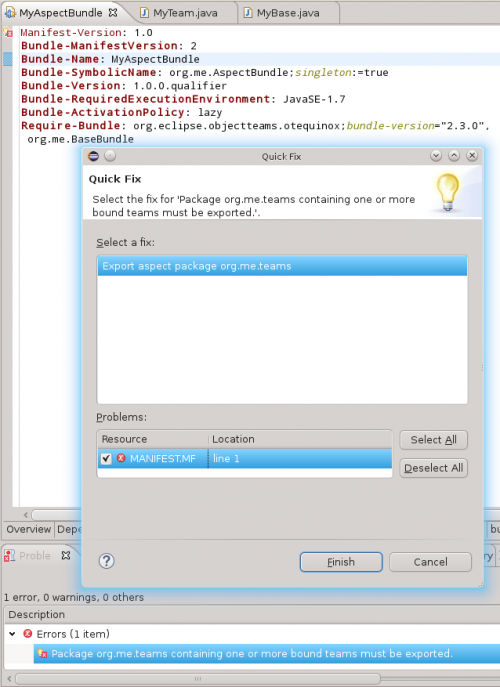Notice: this Wiki will be going read only early in 2024 and edits will no longer be possible. Please see: https://gitlab.eclipse.org/eclipsefdn/helpdesk/-/wikis/Wiki-shutdown-plan for the plan.
Difference between revisions of "OTVersions/Migrating to Luna"
(Created page with "The Luna development cycle introduced three changes of technology, that could potentially require actions from users: * Migration to a new implementation of the '''Equinox''' ...") |
|||
| Line 9: | Line 9: | ||
Although efforts have been invested to make this change transparent for users a few inevitable changes occurred that may require action from users: | Although efforts have been invested to make this change transparent for users a few inevitable changes occurred that may require action from users: | ||
| + | ===Package exports=== | ||
| + | During weaving we insert calls from a bound base class to each Team having Role bound to the base class. This implies that the base class must be able to "see" (in the OSGi/ClassLoader sense) the Team class. Previously, this was handled on a per-class basis during custom classloading. In the new implementation we no longer change any class loading strategy (which makes us conform to plain OSGi actually), but in turn this requires a little help from users. | ||
| + | |||
| + | Any bundle defining any Team classes adapting base classes of a nother bundle must now ''export'' the package containing the Team. In this export the aspect bundle must identify itself in order to prevent "split-package" issues: | ||
| + | |||
| + | Manifest-Version: 1.0 | ||
| + | Bundle-ManifestVersion: 2 | ||
| + | Bundle-Name: MyAspectBundle | ||
| + | Bundle-SymbolicName: org.me.AspectBundle;singleton:=true | ||
| + | Bundle-Version: 1.0.0 | ||
| + | Require-Bundle: org.eclipse.core.runtime, | ||
| + | org.eclipse.objectteams.otequinox, | ||
| + | org.me.BaseBundle;bundle-version="1.0.0" | ||
| + | Bundle-ActivationPolicy: lazy | ||
| + | Bundle-RequiredExecutionEnvironment: Java2SE-1.7 | ||
| + | Export-Package: org.me.teams;ot-aspect-host=org.me.AspectBundle | ||
| + | |||
| + | If this export is missing for a bound Team class, an error is flagged against MANIFEST.MF, for which the following quick fix is offered: | ||
| + | |||
| + | [[Image:QFAddAspectExport.png|center|500px]] | ||
| + | |||
| + | By applying the quick fix, the manifest is changed to: | ||
| + | |||
| + | [[Image:QFAddAspectExport1.png|center|500px]] | ||
| + | |||
| + | |||
| + | ===Positive side effects=== | ||
| + | |||
| + | Loading and activation of Teams happens more '''lazily''' now, i.e., only when a base class is loaded that is affected by any role bindings. Previously, loading and activation of Teams could lead to eager loading of transitively referenced bundles, thus causing longer start-up times of Eclipse. With the new scheme, Eclipse's lazy loading should be basically restored resulting in shorter start-up times. | ||
| Line 14: | Line 43: | ||
==Object Teams Dynamic Runtime Environment== | ==Object Teams Dynamic Runtime Environment== | ||
| + | |||
| + | ===Requires ASM 5.0.1=== | ||
[[Category:Object Teams]] | [[Category:Object Teams]] | ||
Revision as of 10:11, 8 June 2014
The Luna development cycle introduced three changes of technology, that could potentially require actions from users:
- Migration to a new implementation of the Equinox framework underlying OT/Equinox
- Adoption of Java 8
- Optional migration to a new byte code weaver (OTDRE)
Contents
OT/Equinox
During a re-implementation of the underlying Equinox framework, the "Adaptor Hooks", previously used by OT/Equinox, have been withdrawn, requiring a re-implementation also of OT/Equinox. See bug 406518 for details.
Although efforts have been invested to make this change transparent for users a few inevitable changes occurred that may require action from users:
Package exports
During weaving we insert calls from a bound base class to each Team having Role bound to the base class. This implies that the base class must be able to "see" (in the OSGi/ClassLoader sense) the Team class. Previously, this was handled on a per-class basis during custom classloading. In the new implementation we no longer change any class loading strategy (which makes us conform to plain OSGi actually), but in turn this requires a little help from users.
Any bundle defining any Team classes adapting base classes of a nother bundle must now export the package containing the Team. In this export the aspect bundle must identify itself in order to prevent "split-package" issues:
Manifest-Version: 1.0 Bundle-ManifestVersion: 2 Bundle-Name: MyAspectBundle Bundle-SymbolicName: org.me.AspectBundle;singleton:=true Bundle-Version: 1.0.0 Require-Bundle: org.eclipse.core.runtime, org.eclipse.objectteams.otequinox, org.me.BaseBundle;bundle-version="1.0.0" Bundle-ActivationPolicy: lazy Bundle-RequiredExecutionEnvironment: Java2SE-1.7 Export-Package: org.me.teams;ot-aspect-host=org.me.AspectBundle
If this export is missing for a bound Team class, an error is flagged against MANIFEST.MF, for which the following quick fix is offered:
By applying the quick fix, the manifest is changed to:
Positive side effects
Loading and activation of Teams happens more lazily now, i.e., only when a base class is loaded that is affected by any role bindings. Previously, loading and activation of Teams could lead to eager loading of transitively referenced bundles, thus causing longer start-up times of Eclipse. With the new scheme, Eclipse's lazy loading should be basically restored resulting in shorter start-up times.


